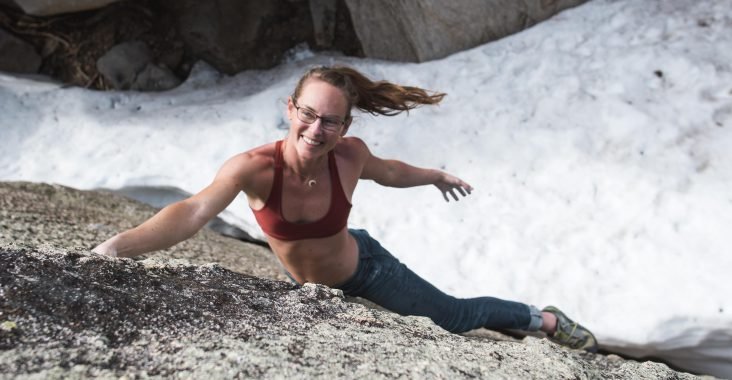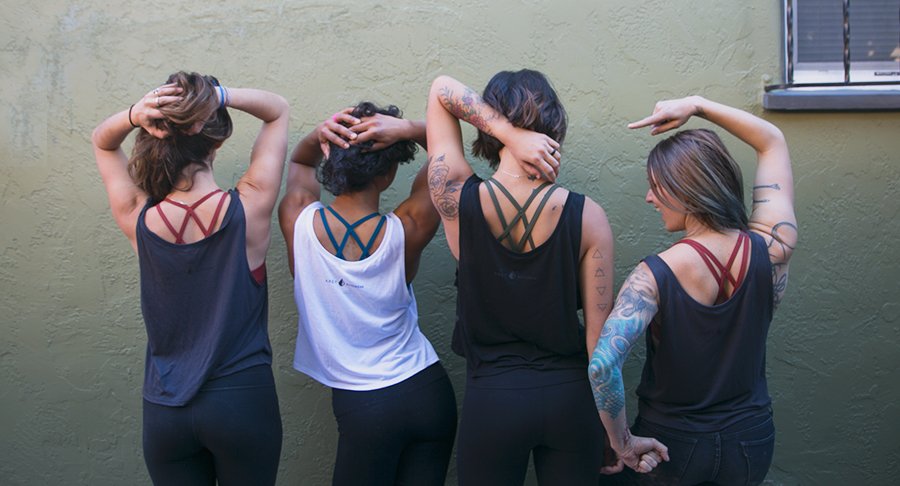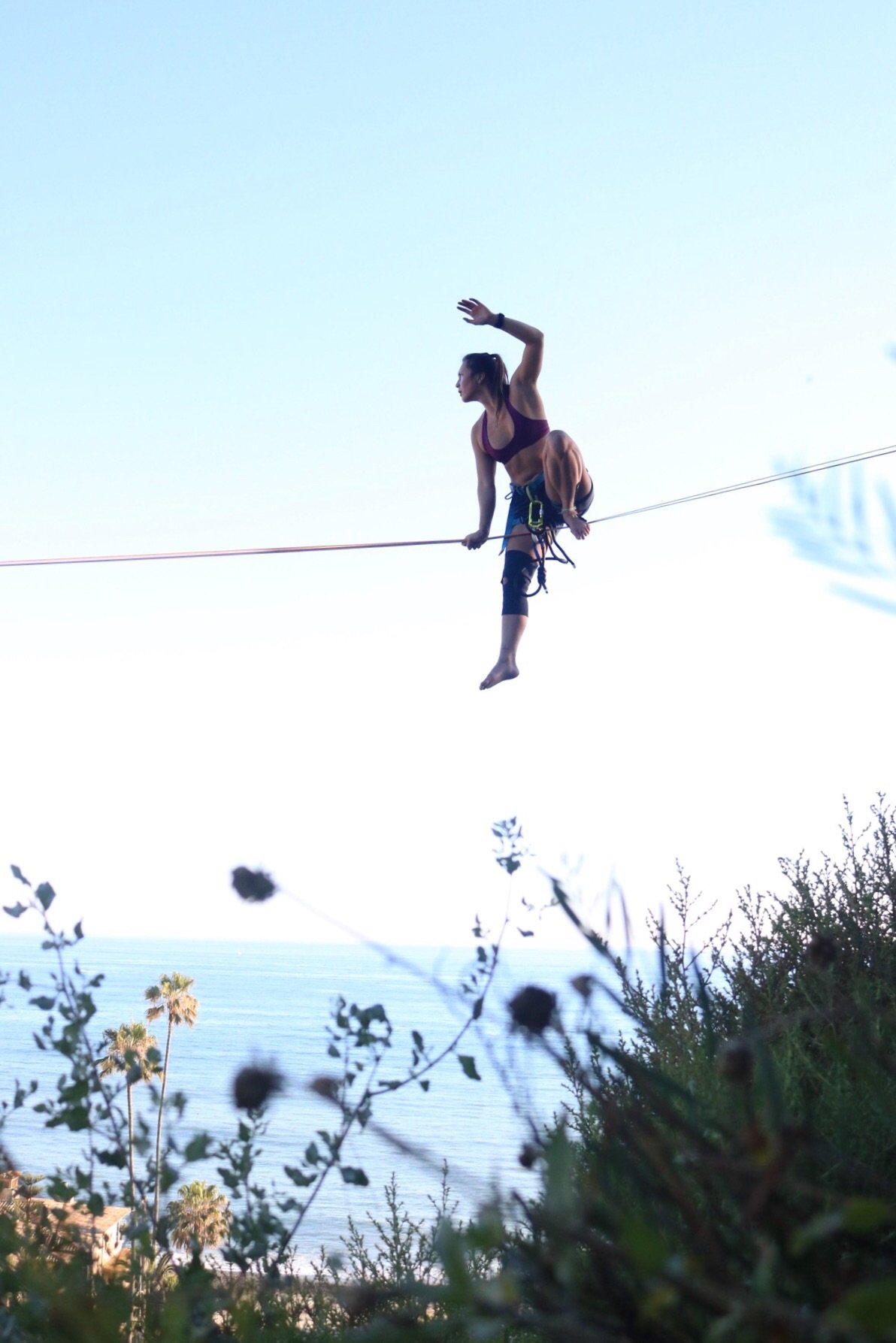Beacons of Badassery — Bridget, Lauren, & Olivia of Têra Kaia
Scrolling through Instagram, I began noticing that many of my favorite climbing ladies were sporting Têra Kaia (formerly Arêt Basewear). I was intrigued by the aesthetics of the design and excited to discover that the company was created by three women to support (literally!) active outdoor women.
I reached out to founders Bridget, Lauren, and Olivia to find out how Têra Kaia came to be, why they love the outdoors, and what it means to be strong in both body and mind.
Photo Courtesy Têra Kaia (formerly Arêt Basewear)
What led to the creation of Têra Kaia (formerly Arêt Basewear)? Did you find a lack of options in outdoor wear designed for women?
OLIVIA: I like our friend’s word for Têra Kaia’s manifestation: Serendipitous. I met Bridget and Lauren through a mutual friend at the local climbing gym, and Bridget noticed I always wore my bikini tops to climb in (because it was so hot!) and because I hated sports bras.
As summer loomed around the corner, I mentioned in passing that I’d probably make my own bikinis again since all the ones I loved were outlandishly expensive. I’ve been making my own bikinis and clothes since I was young. I remember Bridget’s face lighting up, “You can do that?!”
One idea lead to another and we eventually came upon what we have dubbed as ‘Basewear’(trademark pending). Basewear is a versatile under-layer that can be worn in any adventure; it never restricts your movement, is completely sweat and waterproof, and extremely flattering on the typical outdoorswoman.
We all agreed that the current options for women’s apparel lacked these seamless, weightless, boundless sportswear solutions, so we decided to create our own.
Olivia highlining in her TOURA
How did each of you get into the outdoors? Growing up or later in life? How do you think that affected your view of what women are capable of?
BRIDGET: My mom’s side of the family is big into backpacking and camping. We went to Yosemite as a family every summer when I was younger, and I looked forward to it all year long. So the adventurous side of me is definitely from my mom. As for the second part of the question, I’ve never really felt women aren’t capable! Growing up I was definitely held to the same standards of hard work a guy would be expected to fulfill, and my gender was never really seen as an excuse or handicap.
LAUREN: My family dabbled in car camping when I was younger, but it wasn’t until I got into climbing outside when I was nineteen years old that I really fell in love with the outdoors. Similar to what Bridget said, I grew up with a very independent, fiery, single mother who taught me that woman are just as capable as men. Climbing was a huge confidence booster for me. Although my mom taught me to be independent, I was still occasionally reminded of the societal misconceptions of being a woman, like not being as fearless or strong as men. Climbing helped me shatter those doubts into dust!
OLIVIA: Likewise, I grew up a couple blocks from the ocean, and then moved about an hour outside of the Rocky Mountains. My parents were always dragging us camping, hiking, and mountaineering. Though I never appreciated it when I was younger, it’s given me an outlet for solace as an adult. My favorite childhood memories revolve around my extended family cabin trips at the lake. When we were cliff jumping, wakeboarding, chopping wood or fishing, everyone was having fun. It wasn’t about who could do this or that – it was about who wanted to participate. I’m not sure if this affected my view of what women are capable of, I just knew I wanted to be a part of what everyone was doing.
Lauren getting inverted while bouldering
“Strong” is one of the keywords that define Têra Kaia – what is your definition of strong?
LAUREN: Strong has multiple meanings to me. Being a climber, it’s hard for me not to think of strong in the literal sense as physical and muscular, but I think it runs deeper than that. Strong can also mean being mentally/emotionally capable; having the confidence to do things that take you outside your comfort level, but also being able to stand up and dust yourself off when you get knocked down.
OLIVIA: Overcoming adversities that coincide with having a sister with special needs hugely contributed to my mental fortitude. I remember being very young and taunted, daily, because my sister has autism.
I had no idea how to answer their remarks! So I just took it. I told myself those kids didn’t have to understand why she was behaving the way she was because I loved her and that’s what mattered.
This mantra changed everything for me. Learning that my mind power and attitude were pinnacle in my endeavors translated smoothly into a long, successful swimming career. The mental fortitude for hours of repetitive movements became my strength. With swimming, you could physically see change with faster times.
Now being strong means growth: growing in any aspect of your life that you want to put your energy into.
Model Monica De La Torre in TOURA High Cut
Strong women have many different body types, and you clearly strive to embrace this body diversity in the images of your brand. How do you think representation like this can affect women’s self-confidence?
BRIDGET: Oh, I’m so glad you asked! This is a super relevant topic to today’s culture, and it’s something that is extremely important to our brand.
To start, I think we have to understand that the public has a very generalized idea of beauty. Every single human is different, not only in what they look like, but also in what they find attractive in others. Society tries to lump all those unique viewpoints into a one-size-fits-all view of what people should aspire to look like, and that’s just ridiculous. The outcome is extremely inconsistent with what people see in the actual world around them, and this can create a lot of confusion and internal conflict. Not just for the individuals who aspire towards this idealized body type, but for society as a whole.
When applied to branding and advertising, this one-size-fits-all approach has the unintentional outcome of making customers feel negatively about themselves, and we’re not down with that. By showing a wide variety of body types, skin types or really anything that makes a person unique, we are creating a more accurate representation of the real world, which makes our brand relatable on a deeper level.
OLIVIA: We’re also so grateful for all the women we’ve met along our journey who have helped us portray this! A relatable brand image is a direct reflection of how representation can affect a woman’s self-confidence. If I see someone with the same body type as me, the same wind swept hair as me, or hell, the same freckles as me, I immediately feel included, like I belong.
Photo Courtesy Arêt Basewear
Bridget, as a front end developer and a route setter, you’ve worked in some very male-dominated environments. How have you handled that, and how has it shaped you? Did your experiences contribute to the desire to create a company that showcases and supports women?
Bridget: Haha, yes I’ve had my fair share of work environments where I’m surrounded by dudes. When I first started setting, I worked with a team of very supportive guys who treated me as their equal. In setting, you have to prove yourself by setting great routes and working well with the team, whether a woman or a man.
Working with men has taught me to work relentlessly hard, be self-sufficient, never take things personally, and be assertive in communication. These are traits that come naturally to me, so it doesn’t feel like I’m changing much to fit in.
Working on Têra Kaia (formerly Arêt Basewear) is totally the inverse! It has taught me to be more mindful, openly include others, and offer more emotional support and encouragement. I think both men and women could benefit from taking cues from the other side. If everyone were a bit more in tune to the opposite gender, I think it would be a more positive work environment overall.
I don’t think working with men has had much influence on my decision to start a company for women. That kind of desire evolves naturally when you get to talking with other women since we have such similar life experiences. If I had to pick which I prefer, I think now I’d pick working with all women. It’s a little more challenging for me, but we get to make unlimited vagina jokes, which is literally the best thing ever.
Lauren enjoying the outdoors
What is each of your favorite kind of outdoor adventure?
BRIDGET: I’m undeniably a boulderer. Going outside to find the most aesthetic lines with the most varied and unique movement in a beautiful setting is my idea of a perfect day. I love to jump in the water, too, but here in So Cal, we don’t have many bodies of water aside from the ocean, so it ends up being a decision between the mountains or the sea.
LAUREN: I love to be in the mountains, specifically the Sierra Nevada. Long multi-pitch trad climbs such as the South Face of Charlotte Dome or Venusian Blind on Temple Crag is my ideal adventure. The views are unbeatable, and I love coming back from a trip in the mountains and feeling utterly wrecked!
OLIVIA: I’m definitely a water baby, but my adventures are broad and boundless. Ideally, I’d spend hours hiking to find a secluded waterfall where I can cliff jump and swim. I also love what bouldering has become for me - not as intense and goal-oriented as my swim career. Now it’s all for fun. I can spend days climbing in the mountains or by the sea. As long as there are places for handstands, adrenaline rushes, slacklines, friends, and whiskey 🙂 Trips like that are magical.
Big thanks to Bridget, Lauren, and Olivia for sharing their perspectives here!Find out more about Têra Kaia (formerly Arêt Basewear) at www.terakaia.com/!
*I’m in no way affiliated with Têra Kaia, but I love that these ladies have created such a cool company to fill a need for so many women!






